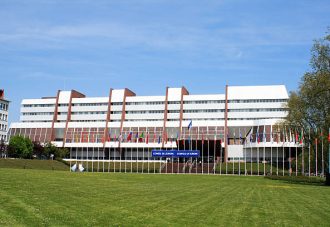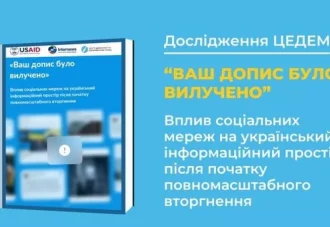January 7, 2025
Марк Цукерберг оголосив про зміни в підходах Meta до регулювання соціальних мереж в наступні 2 місяці. За його словами, зміни принесуть більше свободи слова, нові інструменти модерації та персоналізації контенту. Мета компанії — мінімізувати надмірне втручання в свободу слова та спростити процеси управління контентом.
Про це засновник Meta Марк Цукерберг повідомив на своїй сторінці у Instagram. Позиція Марка полягає в тому, що система робить надто багато помилок і навіть 1% помилково видаленого контенту — це мільйони людей. Саме тому, Meta хоче повернути людям голос. Більш того, Марк наголошує, що раніше люди хотіли не бачити політичного контенту, а тепер запит на такий контент повернувся.
Ключові зміни:
🟢Відмова від програми сторонньої перевірки фактів на користь Community Notes
У США Meta припиняє програму фактчекінгу за участю сторонніх організацій, яка часто викликала суперечки через політичну упередженість.
“Подібно до X, починаючи зі США після того, як Трампа вперше обрали у 2016 році, традиційні медіа безперервно писали про те, що дезінформація становить загрозу для демократії. Ми щиро намагалися вирішити ці проблеми, не стаючи арбітрами істини. Однак фактчекери виявилися надто політично упередженими”, – поділився очільник Meta.
Замість цього компанія впроваджує модель Community Notes, яка працює на платформі X (раніше Twitter). Нова система дозволить користувачам самостійно додавати контекст до публікацій. Meta забезпечить прозорість процесу, залучаючи учасників з різних точок зору.
[Вріз: Community Notes (раніше відомі як Birdwatch) — це функція соціальної мережі X (колишній Twitter), яка дозволяє користувачам спільно створювати та перевіряти контекст до публікацій. Її мета — підвищення прозорості та боротьба з дезінформацією через колективну модерацію. Користувачі можуть додавати пояснення або фактичну перевірку до публікацій інших користувачів. Нотатки оцінюються іншими учасниками спільноти. Якщо різні групи користувачів (з різними поглядами) знаходять їх корисними, ці нотатки стають видимими для всіх. ]
🟢Розширення свободи слова
Meta переглядає свої правила, зменшуючи обмеження на політичний та соціальний контент, зокрема щодо імміграції, гендерної ідентичності тощо. Компанія більше не демотуватиме контент, заснований на попередніх прогнозах алгоритмів, і зосередить свої ресурси на боротьбі з незаконною діяльністю, як-от тероризм, шахрайство чи експлуатація дітей.
🟢Персоналізований підхід до політичного контенту
Meta повертає політичний контент у стрічки користувачів, але з акцентом на персоналізацію. Люди, які хочуть бачити більше політичних постів, отримають відповідні налаштування, що базуватимуться на їхній активності, уподобаннях та переглядах.
Як заявив Марк головна ідея цих змін полягає в тому, що “після років зосередження нашої роботи з модерації контенту переважно на видаленні матеріалів, настав час зосередитися на зменшенні помилок, спрощенні наших систем і поверненні до основ — наданні людям голосу.”
Запуск оновлених програм заплановано у США, з поступовим розширенням на інші країни.
Хоч поки не зрозуміло яким чином ці зміни будуть впроваджені, ЦЕДЕМ буде слідкувати за ними і оперативно інформувати вас про це.
Текст промови Марка Цукерберга публікуємо нижче:
|
I want to talk about something important today, because it’s time to get back to our roots around free expression on Facebook and Instagram. I started building social media to give people a voice. I gave a speech at Georgetown five years ago about the importance of protecting free expression, and I still believe this today.
But a lot has happened over the last several years. There’s been widespread debate about potential harms from online content. Governments and legacy media have pushed to censor more and more. A lot of this is clearly political, but there’s also a lot of legitimately bad stuff out there. Drugs, terrorism, child exploitation.
These are things that we take very seriously and I want to make sure that we handle responsibly. So we built a lot of complex systems to moderate content. But the problem with complex systems is they make mistakes. Even if they accidentally censor just 1 percent of posts, that’s millions of people. And we’ve reached a point where it’s just too many mistakes and too much censorship.
The recent elections also feel like a cultural tipping point towards once again prioritizing speech. So we’re going to get back to our roots and focus on reducing mistakes, simplifying our policies, and restoring free expression on our platforms. More specifically, here’s what we’re going to do. First, we’re going to get rid of fact checkers and replace them with community notes.
Similar to X, starting in the U. S. After Trump first got elected in 2016, the legacy media wrote non stop about how misinformation was a threat to democracy. We tried in good faith to address those concerns without becoming the arbiters of truth. But the fact checkers have just been too politically biased.
And have destroyed more trust than they’ve created, especially in the U. S. So over the next couple of months, we’re going to phase in a more comprehensive community notes system. Second, we’re going to simplify our content policies and get rid of a bunch of restrictions on topics like immigration and gender that are just out of touch with mainstream discourse.
What started as a movement to be more inclusive. has increasingly been used to shut down opinions and shut out people with different ideas, and it’s gone too far. So I want to make sure that people can share their beliefs and experiences on our platforms. Third, we’re changing how we enforce our policies to reduce the mistakes that account for the vast majority of censorship on our platforms.
We used to have filters that scanned for any policy violation. Now, we’re going to focus those filters on tackling illegal and high severity violations. And for lower severity violations, we’re going to rely on someone reporting an issue before we take action. The problem is that the filters make mistakes, and they take down a lot of content that they shouldn’t.
So by dialing them back, we’re going to dramatically reduce the amount of censorship on our platforms. We’re also going to tune our content filters to require much higher confidence before taking down content. The reality is that this is a trade off. It means we’re going to catch less bad stuff, but we’ll also reduce the number of innocent people’s posts and accounts that we accidentally take down.
Fourth, we’re bringing back civic content. For a while, the community asked to see less politics because it was making people stressed, so we stopped recommending these posts. But it feels like we’re in a new era now, and we’re starting to get feedback that people want to see this content again. So we’re going to start phasing this back into Facebook, Instagram, and threads while working to keep the communities friendly and positive.
Fifth, we’re going to move our trust and safety and content moderation teams. Out of California and our us based content review is going to be based in Texas. As we work to promote free expression, I think that it will help us build trust to do this work in places where there is less concern about the bias of our teams.
Finally, we’re going to work with president Trump. To push back on governments around the world that are going after American companies and pushing to censor more. The US has the strongest constitutional protections for free expression in the world. Europe has an ever increasing number of laws institutionalizing censorship and making it difficult to build anything innovative there.
Latin American countries have secret courts that can order companies to quietly take things down. China has censored our apps from even working in the country. The only way that we can push back on this global trend is with the support of the U. S. government. And that’s why it’s been so difficult over the past four years when even the U. S. government has pushed for censorship. By going after us and other American companies, it has emboldened other governments to go even further. But now we have the opportunity to restore free expression, and I am excited to take it. It’ll take time to get this right, and these are complex systems, they’re never going to be perfect.
There’s also a lot of illegal stuff that we still need to work very hard to remove. But the bottom line is that after years of having our content moderation work focus primarily on removing content, it is time to focus on reducing mistakes, simplifying our systems, and getting back to our roots about giving people voice.
I’m looking forward to this next chapter. Stay good out there, and more to come soon.
|



